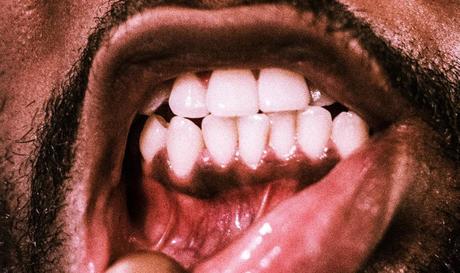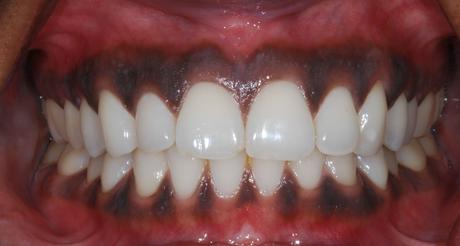Black gums can be a normal pigmentation for people with dark skin tones. However, black gums or black patches on your gums that are new may indicate a health concern. Gum color varies from person to person. Black gums and other changes in gum color can be caused by a medical condition, medication, smoking, or other lifestyle factors.
The gums are tough tissues that surround and hold the teeth in place. They can range in color from red or pink to brown or black. Sometimes gums are black.
If you have black gums or noticed someone who had black gums you may be wondering that are black gums normal.
The answer is that it depends. In many situations, yes, black gums are normal.
Some gums are just naturally darker than others (especially in non-Caucasians). The gums can also be dark spotted and/or have no pink in them at all.
And there is absolutely nothing wrong with gums like this. Other times, black gums are a sign of a problem.

Gum color varies from person to person, in the case of black gums but gingivitis or any other gum color change may be due to medical reasons, medications, cigarettes, or other factors.
Melanin is a dark pigment that is responsible for skin color. There is also melanin in the gums. The color of the gums may be more on one side, or it may be spotted. Gingivitis is normal due to an increase in melanin and does not require treatment.
If your gums are normally pink and now black due to various factors, pigmentation has occurred in your gums. In some cases, gingival pigmentation or gingival pigmentation is caused by the deposition of melanin in the gums. These black spots on the gums do not cause disease or complication, but they destroy the beauty of the gums. You can go to the dentist or visit our dental clinic website and the relevant specialist to fix it.
What Causes Black Gums
Melanin
Melanin is a substance that colours the skin, hair, and eyes. The body naturally produces melanin. The more melanin you have, the darker your hair, skin, or eyes. The gums’ dark brown or black color can also be due to the high amount of melanin in the body. If a person’s gums have always been very dark, there is no reason to worry.
But if the discoloration of the gums has occurred briefly or if black spots have formed on the gums, it probably has nothing to do with melanin and indicates a problem that needs to be investigated.
Cigarettes and tobacco
Tobacco smoke changes the color of the gums. There are specific cells in the body called melanocytes that produce melanin. The nicotine in tobacco causes melanocytes to produce more melanin than usual. This condition is called melanosis in smokers.
In this case, the gums become brown or black. Discoloration due to melanosis may be spotty or cover the entire mouth. The inner surface of the cheeks or lower lip may also change color.
Research has linked smoking cessation to reduced gingival opacity. This indicates that dark spots on the gums caused by smoking may be reversible.
Medicine
Minocycline (minocycline) is a drug used to treat pimples and acne, and other infections such as chlamydia. An uncommon side effect of this drug is discoloration, which sometimes occurs in the mouth.
Amalgam tattoo
An amalgam tattoo (a silver-filled tooth-filling material) may appear around a filled tooth, although you may see it anywhere in the mouth. The amalgam effect or tattoo is seen as a black, blue, or gray spot inside the mouth.
Amalgam is a compound of metals used to fill teeth. If the particles of this toothpaste are removed, they may appear under the skin of the gums. There is no need for treatment for this condition and no health risk.
Wound gingivitis acute necrosis
Acute necrotic ulcer or molar gingivitis is a gum infection that causes fever, gum pain, and bad breath. Gingival diseases can cause gingivitis because a layer of dead tissue accumulates in the gums.
Tinnitus results from the rapid growth of bacteria in the mouth, usually due to a gum infection. Bacteria may accumulate in the mouth due to poor oral hygiene, stress, lack of sleep, or an unhealthy diet.
Early signs of acute ulcerative gingivitis include bleeding gums, bad breath, excessive salivation, and discomfort. There may be sores around the gums around the teeth.
The treatment of this infection is simple. The dentist scales and cleans the mouth and prescribes antibiotics.
Addison’s disease
Addison’s disease affects the adrenal glands responsible for producing various hormones. This disorder prevents the function of these glands. Early signs of Addison’s disease include:
- Fatigue
- Feeling more thirsty than usual
- Unwanted weight loss
- Decreased appetite
- Muscle weakness
As Addison’s disease progresses, a person may experience darkening of the gums and lips. The medical term for this complication is pigmentation or hyperpigmentation.
In addition to affecting the lips and gums, Addison’s disease can cause dark spots on the skin in other parts of the body. The most common areas of the knees are the palms of the hands, the knuckles, and scar tissue.
Problems with the immune system cause most cases of Addison’s disease. This causes the body to attack and damage the adrenal glands. Addison’s disease can have serious side effects if left untreated. If the amount of hormones in the body (which must be produced by the adrenal glands) drops too much, an adrenal crisis can occur. Symptoms of an adrenal problem include severe dehydration, rapid, shallow breathing, drowsiness, and pale, cold skin. An adrenal concern is an emergency.
Putz-Jaggers Syndrome
Putz-Jagger syndrome is a genetic condition that increases the risk of polyps or cancer. One of the first symptoms is brown or dark blue spots. These spots may form on the mouth and skin of the fingers and toes. Pots-jaw spots usually appear in childhood and disappear with age. Another key symptom of this condition is bleeding or obstruction in the gastrointestinal tract, usually in childhood. Genetic testing shows whether you have Putz-Jagger syndrome.
QUALITY AFFORDABLE DENTAL IMPLANTS
Copperhills Family Dentistry specialists provide specialized dental services that help our patients cultivate healthy and happy smiles. We’re happy to provide compassionate care coupled with cutting-edge technology.
Read moreSymptoms of Black Gums
Signs of black gums around teeth include:
- Bleeding gums
- Intense pain
- Bad breath
- Dark staining on the surface of the teeth
- Loose teeth
- Hard deposits on the teeth
- Red, swollen, or bleeding gums
- Red, swollen gums can also indicate other oral concerns, such as dental abscesses or gum disease.
The causes of black gums can usually be treated. Genetic conditions often show a range of symptoms that can help a doctor or dentist to diagnose a disease.
Paying attention to changes in the color of the gums can help a person find and treat any health problems early.
If your gums are typically pink, but you notice they’re turning black, it could be a sign of disease. Black gum disease is also called acute necrotizing periodontal disease. And it’s about as nasty as it sounds.
With this disease, the discoloration is due to dead tissue and is a severe medical condition.
Left untreated, this can spread to cartilage and your bone.

Gum Disease (Gingivitis)
Gingivitis is a common type of gum disease. It is the result of bacterial buildup on the teeth. This buildup irritates surrounding gum tissue and can cause the gums to become inflamed, discoloured, and painful to the touch.
Most people can treat gingivitis with regular good oral hygiene practices. Regular dental checkups can help identify and treat gum disease signs in good time.
Whitening cosmetic
dentistry dental cleaning
and checkups
How can I get rid of black gums?
Black gums don’t always require treatment. However, some people prefer treatment for cosmetic reasons. Regular appointments with your dentist are an excellent way to ensure you don’t miss anything. Remember, they can see the far reaches of your mouth better than you can! If you have black lesions on your gums, some treatment options include surgical abrasion, scalpel gingivectomy, laser vaporization, cryosurgery, electrosurgery, chemical methods, and gingival grafts. Discussing your options with your dentist to determine the best oral health solution is essential.
- Excision of the darkened spots with a scalpel works well, but it may be temporary depending on the underlying cause.
- Cryosurgery, or freezing the gums, reduces the chance of recurrence.
- Gingival grafting involves taking unpigmented tissue from the roof of your mouth and applying it to the affected gums.
Treatment methods for black gums?
If you’ve developed black gums, there are some simple things you can do yourself to try to lighten up your gums again.
Partly the treatment depends on the cause.
- Black gums due to poor oral hygiene?
Try brushing and flossing twice a day.
- Due to smoking?
Quit smoking (we know… easier said than done).
- Stress turning your pink gums, black?
Try reducing stress through yoga or sticking pins in a voodoo doll that looks like your ex!
- Another option – if your gums are otherwise healthy – is Gum Depigmentation.
The gum depigmentation process involves the use of a laser which reacts with the water in your gums that lightens and evens out the color.
The laser vaporizes and removes the thin top layer of your gum tissue.
This destroys the melanin-producing cells, and, as you heal, the new tissue that’s created tends to be pink instead of black or brown. Dark Gum Concerns?
If you suddenly notice that previously pink gums have turned black, visit your dentist and get checked out.
Especially if you have other symptoms like bleeding gums.
Good oral health is essential for overall well-being. Changes in the color of the gums can indicate an underlying health problem, so a person should speak to a doctor to determine the cause.
Don’t put off treatment and risk making a bad problem worse.
To find a dentist near you that can help determine if your black gums are expected or the sign of trouble, visit Copperhills Family Dentistry. We’re offering free dental consultations. Call Today!

